It will take you two seconds to read this sentence. That was the winning margin Sergio Henao held over Alberto Contador after a thrilling thrilling week of racing where the result in suspense until the end.
Was there a winning moment? Alberto Contador could spend another week going back over the moments he lost a second here or there, that time bonus on the Mur de Fayence taken by Henao, th lack of a team mate up the road on the final stage and why did Ion Izagirre pull so hard on the descent into Nice? This was a rich race full of action that it’s impossible to reduce to one moment.
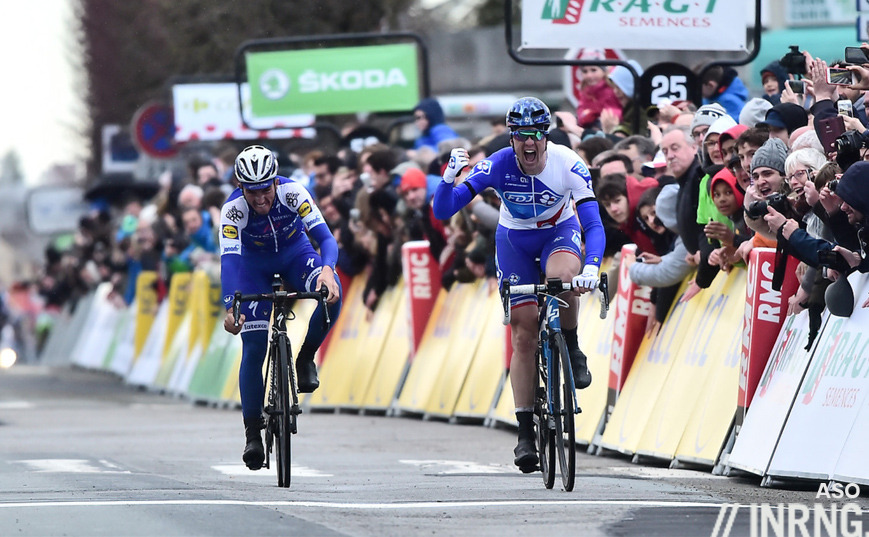
On paper the opening stage looked like a circuit race to ease into the race and promote the Yveslines regional government paying for the start. The wind blew this paper away as well as the chances of many overall contenders. Rain and crosswinds split the peloton apart on the first two days and Arnaud Démare was the winner, taking the first stage after being the only rider left who could follow Julian Alaphilippe’s uphill attack and then holding the yellow jersey for several days thanks to an attentive FDJ team. French rivals Ag2r La Mondiale didn’t have it so good with Romain Bardet disqualified for a “sticky bidon”, pro cycling’s euphemism for cheating. Bardet handled the issue with a concise mea culpa. Not for nothing did his masters degree included work experience in communications and social media.
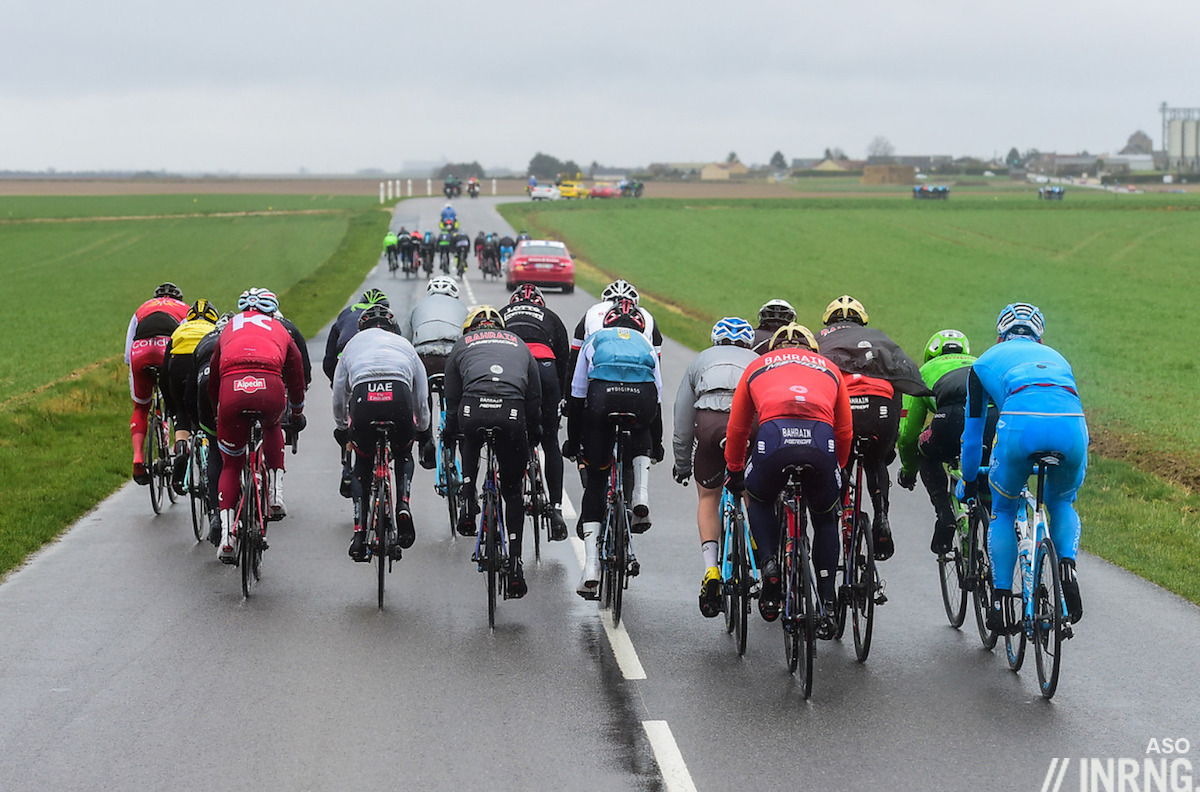
Sonny Colbrelli (he’s named after a Miami Vice character, true story), found an ember of warmth left inside to win the sprint after a dismal day for the riders but an exciting one to follow for all the accounts of the peloton being scattered into small groups, a big win for Colbrelli and his team and another name to add to the long list of contenders for Milan-Sanremo as our thoughts turn to the race. Richie Porte lost the race this day as he went like a hobo from one group to another in search of shelter.
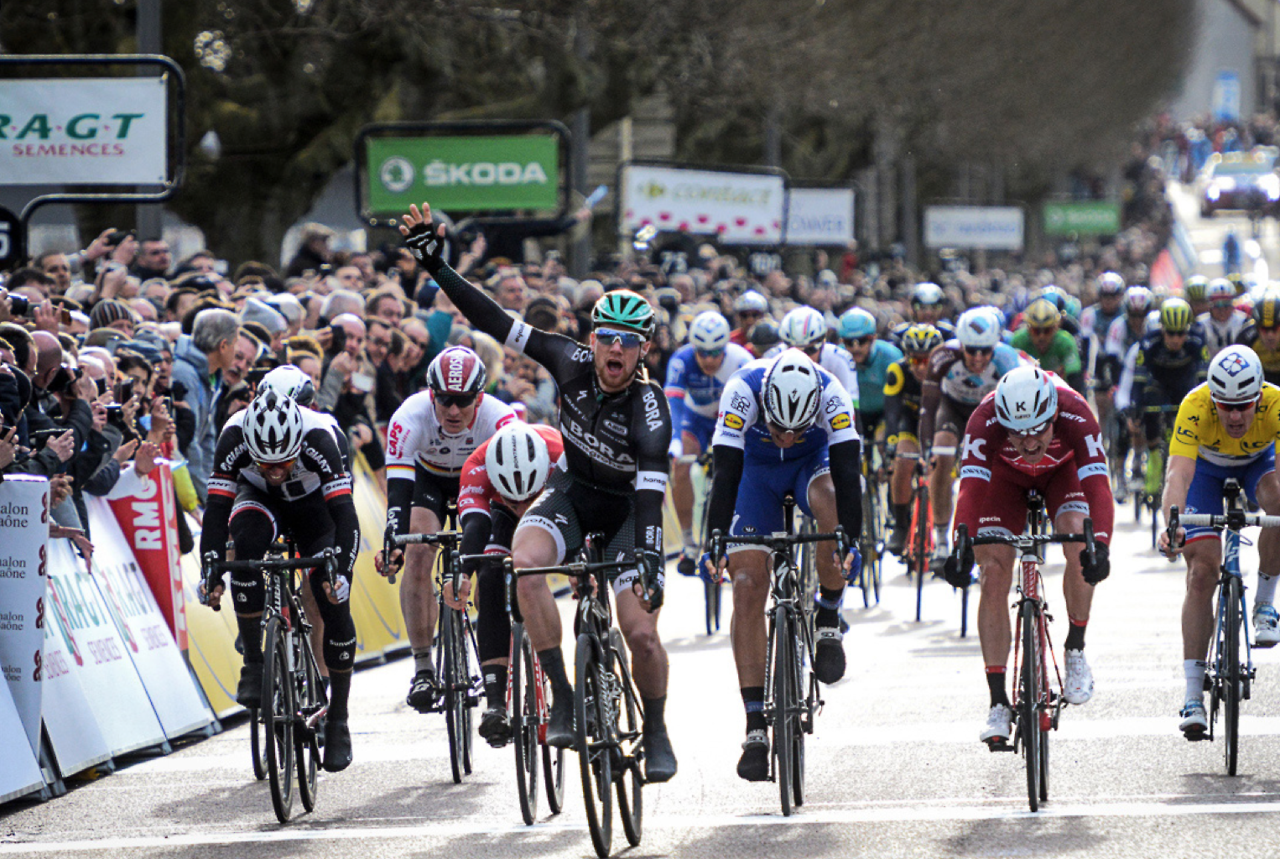
Sam Bennett took a surprise stage win, he’s been due a big win the quality of the opposition here only made his triumph bigger as he finished of Kristoff, Degenkolb, Kittel, Matthews, Démare and Greipel in a straight speed contest. Two days later André Greipel took a sprint win to prove his consistency and reliability.
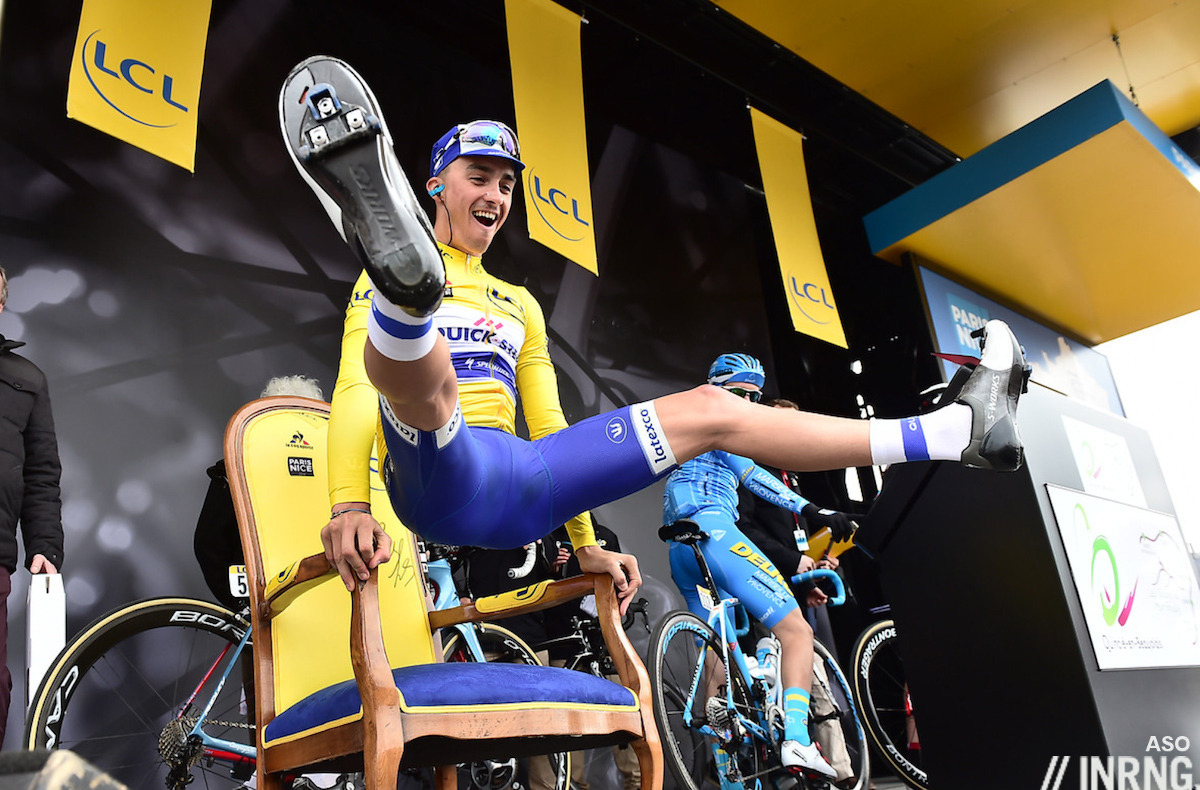
The race returned to Mont Brouilly after last year’s snowfall cancelled the stage. It was a good decision to return with a time trial as it offered a balanced course, some flatter roads through the vineyards before the awkward climb to the top of Mont Brouilly. Alaphilippe took an emphatic stage win and the yellow jersey because he’d been in the front each time the race had split. It was the manner of his win that surprised: he was the fastest on the flat roads which was unusual for a young rider who is also 63kg; then he held his own on the climb and won the stage by 19 seconds on Alberto Contador. For reference Sergio Henao was eighth at 48 seconds and Dan Martin 13th at 63 seconds.
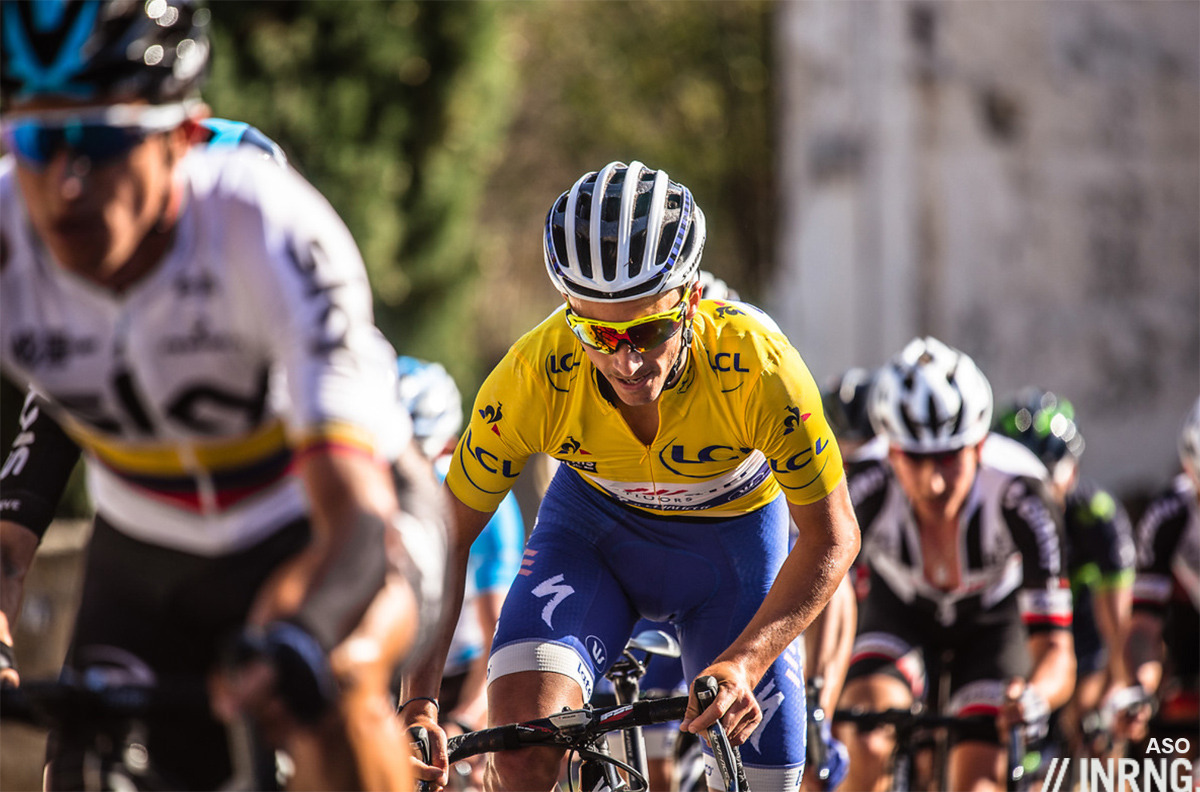
The Mur de Fayence saw Simon Yates win the stage and Alaphilippe surrender 12 seconds to Henao, not much in isolation but beaucoup in less than one kilometre on the eve of the crucial summit finish. Alaphilippe duly cracked and lost the overall lead on the Col de la Couillole the next day. An irony is that if ASO had designed a classic route without the high altitude finish and its 15km climb then quite possibly the French would be triumphantly welcoming the first home winner of the race since Laurent Jalabert 20 years ago. Still Julian Alaphilippe finishes the week a greater rider than when he started. He began with a second place to Démare on the opening stage, yet another, but this is still a learning experience for a 24 year old who finishes the week with a time trial stage win, a spell in yellow and the points competition. Being French the inevitable question is can he win Le Tour? Non right now although this year’s course with fewer mountains than usual will pose a dilemma: a high GC or stage wins?
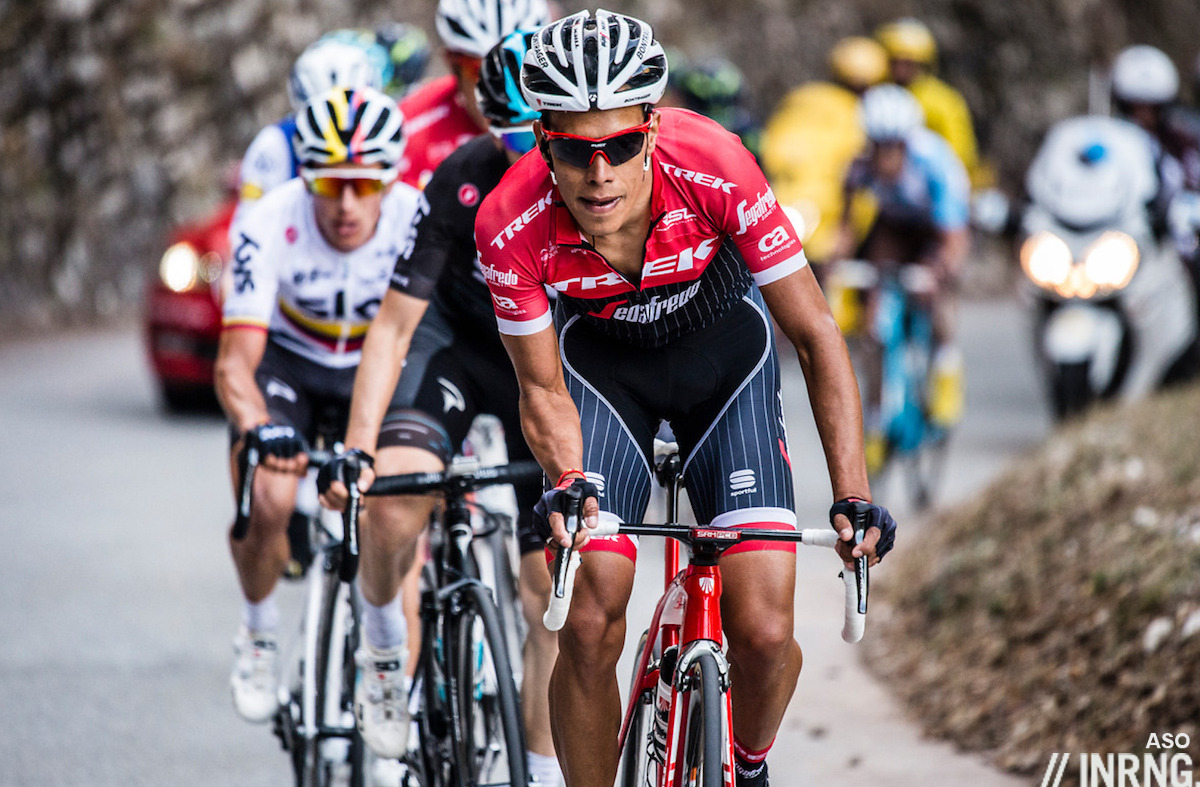
A big summit finish can dominate the race, the fear that a long climb establishes an unshakable pecking order that merely renders all future racing a repeat but fortunately the Couillole managed to enliven the race and mix-up the overall classification with one day to go. Jarlinson Pantano savaged what was left of the lead group and if Porte took the stage win, Alberto Contador took back 11 seconds on Sergio Henao and gained confidence he was climbing faster.
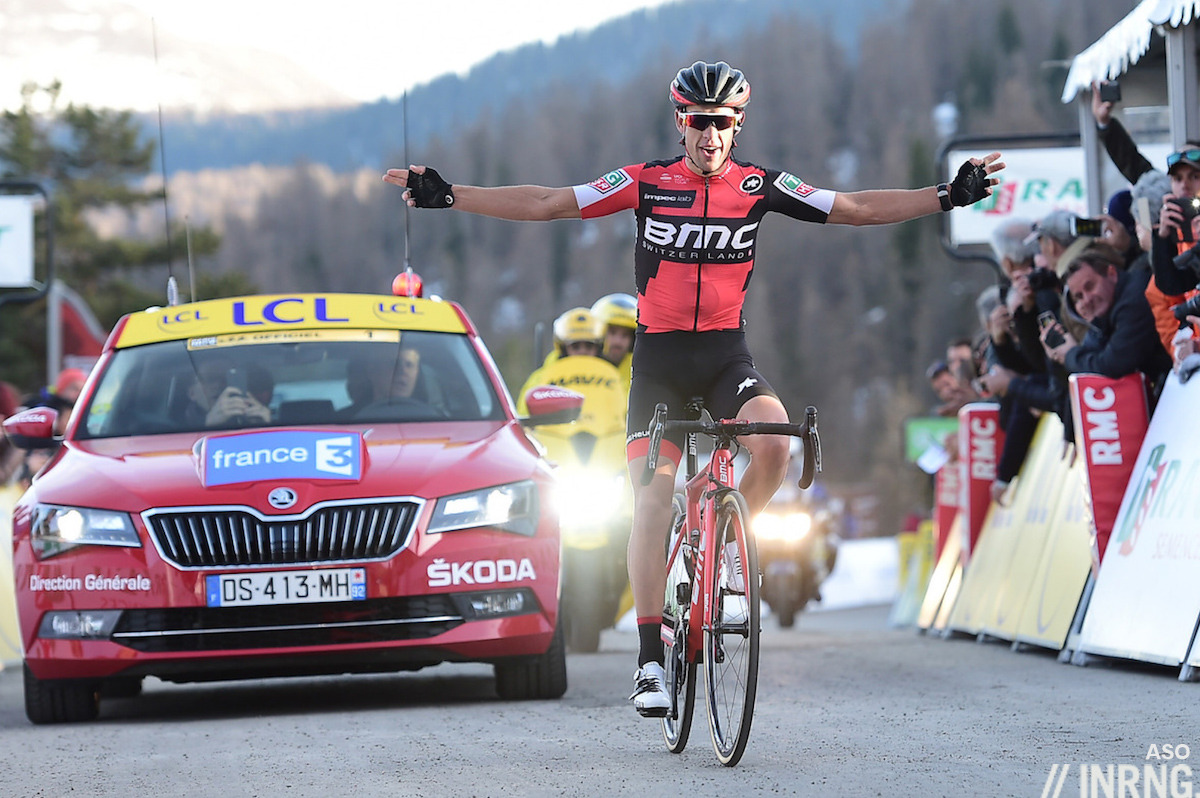
Richie Porte’s stage win mattered in its own right because he left a pile of contenders behind and set a very fast time up the climb. We know he can climb fast but confirming this will reassure him. Perhaps the greater reassurance went to his team because despite the setbacks of the second stage he bounced back. For the arithmetic record if it wasn’t for those crosswinds he’d have finished on the podium if everything else stayed equal.
The final Sunday came and Sergio Henao started the day in yellow with 30s on Dan Martin and 31s on Contador. What could Contador do? Not for him a tour of the Nice arrière pays however enjoyable the roads might be. But how to beat Henao? A late attack on the Col d’Eze would be too late, there was not enough time to take 30 seconds and besides the climb is regular and the kind where following the wheels helps. It would have to be the climb to Peille, with its 10% sections and so many twists that a rider can quickly get out of sight. But with 50km to go? It’s the sort of thing Contador does when others don’t. It was obvious in both hindsight and foresight but Contador still did it and he still dropped Henao. He did it last year too but crucially then he’d sent riders up the road to act as relay points and this time as Contador overhauled the early breakaway he didn’t have a team mate waiting to help, a luxury surely worth a handful of seconds? Behind Sergio Henao had two team mates in his cousin Sebastian and David Lopez but they could only hope to contain Contador’s lead and they blew by the time they reached the Col d’Eze.
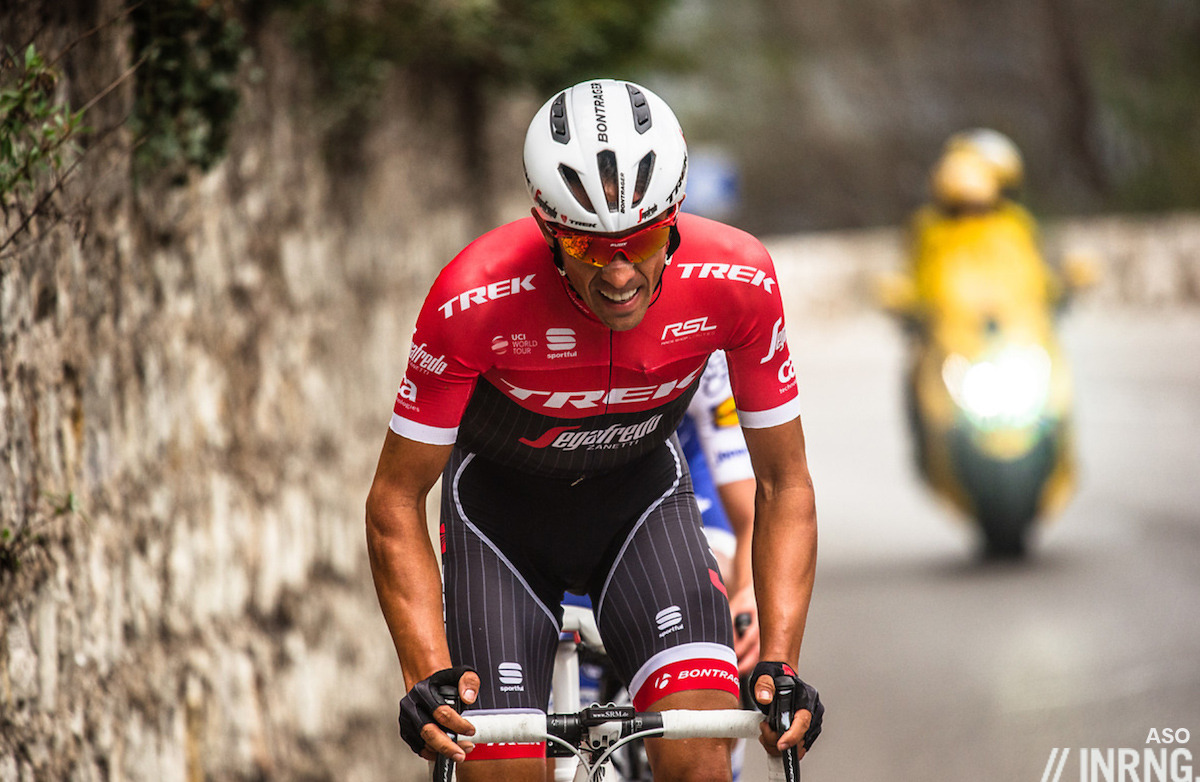
The race has abandoned the Col d’Eze time trial, presumably because it’s a ratings flop – time trials always are – yet Contador and Henao were each locked in their own private TT up the climb, albeit with a string of riders sitting on their wheel. Contador “won” the uphill TT and stretched his lead to beyond a minute over the top of the Col but the long descent doesn’t a lone rider. In fact Contador wasn’t alone but two compatriots were of little use, Marc Soler and David De La Cruz didn’t offer any Hispanic help. Soler tried a solo move, De La Cruz won the stage. Behind Ion Izagirre was chasing hard and it’s hard to know why, perhaps an assist for his brother Gorka to contain the group so his fourth place wasn’t troubled, perhaps an old-fashioned deal where Henao could pledge a share of the prize pot if the win was secured?
The clock counted down but it wasn’t so simple as Contador had taken time bonuses in an intermediate sprint and at the finish line so when Henao came in 21 seconds later many were doing their calculations and frantically looking up the milliseconds awarded in the Brouilly time trial. Henao won, just and by two seconds which is the narrowest ever victory margin in this race.
On a team loaded with leaders Henao took his chance, helped by the late withdrawal of Wout Poels. He’s an infrequent winner, in part because he’s a worker on Team Sky but also because he’s had his share of mishaps and more. He was out of action after smashing his kneecap to smithereens in the Tour de Suisse and he was off racing twice when rested, parked or suspended following two investigations into his blood values and cleared each time. We’re still waiting to read the promised science paper written on the back of this and he says he’d gladly publish his bio passport data and we’ll see if the oft-promised glasnost at Team Sky happens.
The Verdict
Another vintage edition. The beauty of the race is its geographic range: the ability to start in northern Europe and late winter and to proceed south towards the Mediterranean where spring is in full bloom. Next weekend’s Milan-Sanremo does something similar but Paris-Nice has a week to explore the terrain with stages past empty cereal fields, through vineyards and over substantial mountain passes meaning there’s ample opportunity for exciting racing along the way and variety too. But the route is only one ingredient, this year’s weather turned two formulaic opening stages into anthological demonstrations of crosswind racing and Contador turned the final stage into a box office cliffhanger. Once again Contador ennobles the winner, his audacity tested his rivals and improved the value of their wins. In years to come Henao’s name will be listed in the record books but we’d do well to remember Contador’s efforts.
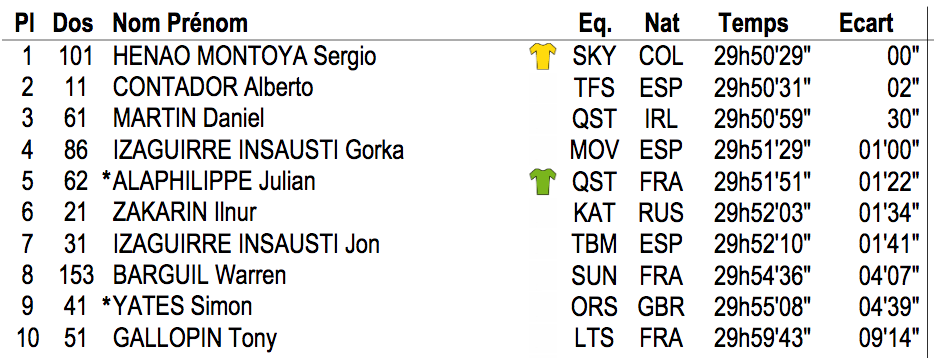

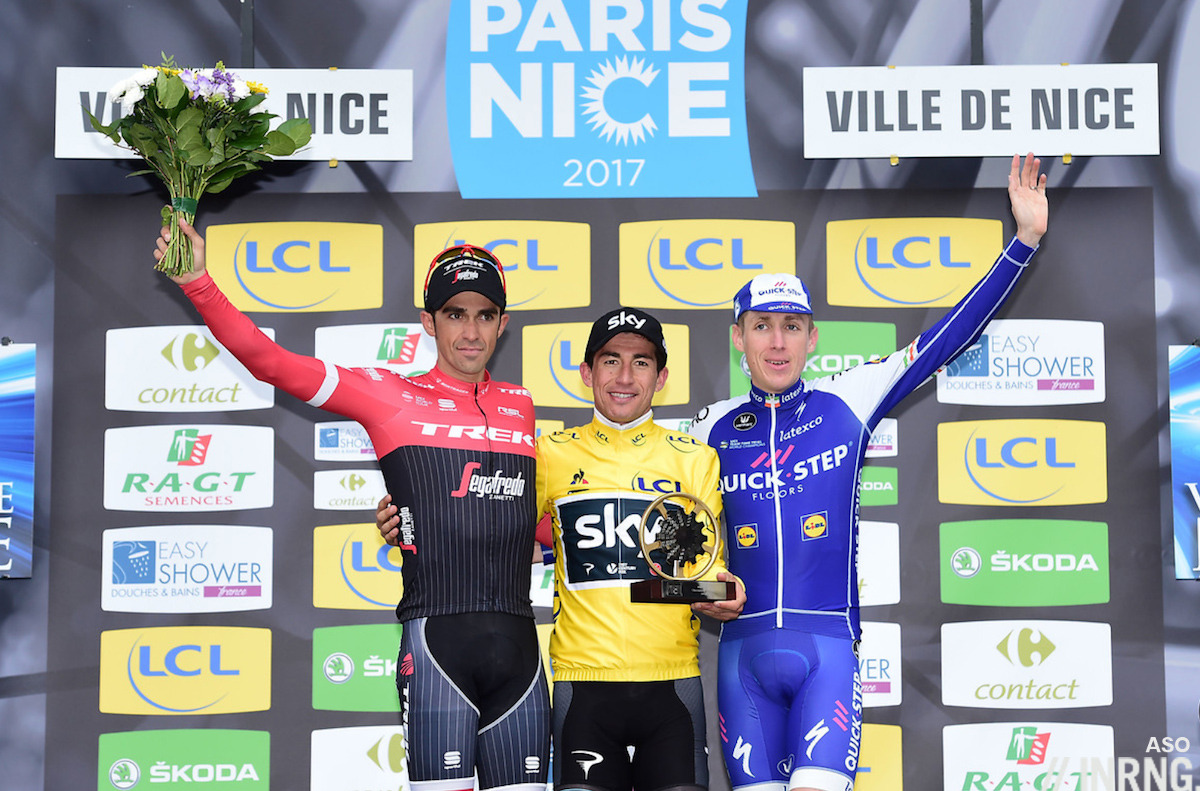
Gripping from start to finish. A great week of racing and excellent coverage, as always.
Roll on MSR!
Inrng, you’ve coined a lasting nickname for Richie Porte: The Hobo from Tasmania! Priceless! 😀
so Contador continues to enrich races regardless of whether he wins or not – what a legend, let’s hope he’s got another couple of years at this level.
You may like him or not, but Kontador really makes races more interesting.
Everybody knew he would try something in Peilles, yet he did and yet it almost worked. Paradoxically, he is a racer that is far more interesting when he is not dominant.
I’m sorry, I must dissent from this view. Contador surely wants to win. He’s made the point before that a man with his palmares does not care about 2nd or 3rd and, fair play, he makes a good point. But, that said, its only 1st that matters and, once again, he didn’t get it. I have great doubts about a man who cannot beat Sergio Henao winning the TDF against Quintana and Froome. Contador 2009 (the last time he officially won the Tour) would have walked this race and now getting plaudits for outrageous attacks is a poor substitute and a definite downgrade.
Only because the expectations of some are unreasonable. Contador hasn’t been a world beater in a fair number of years, so the “definite downgrade” is already there.
But at least he’s still trying and putting people in difficulty, which enlivens the race. No one really expected Voeckler to win the TdF, but he made it more enjoyable. Contador has an outsider’s chance, and seeing a defeat at the Tour as a disappointment misses the fact that he’s not a favourite.
Fair number of years = 2, I guess.
Beating Froome (besides Valverde, Purito, Aru…) in the 2014 Vuelta is a fine definition of “world beater”, I’d say.
The kind of season in which you win in a sensational fashion the Tirreno-Adriatico, along with the País Vasco and the Vuelta itself, while your *worst* result in *each and every* stage race you finish (Algarve, Tirreno, Catalunya, País Vasco, Dauphiné, Vuelta) is 2nd place.
All year long, Froome, Quintana, Nibali, Valverde were being systematically beat every time they crossed sword with Contador – and he could finish the race (note that the TdF was indeed his only DNF that year).
Writing fair and meaning “two” is quite unfair, I’d say, just as it would be pretty much unfair (or simply absurd) not considering 2014 as “world beater” kind of season by Contador.
I won’t even mention the fact that in 2015 Contador was occasionally winning one of those petty GTs – uff, so many of them around, hard to keep record of ’em all – like he did at the Giro (…yeah, yeah, I didn’t include 2015 because I guess some people would start to cry that the top ten wasn’t “world level” enough) or beating a world level Quintana in a minor race because, all in all, the season was already mediocre for Contador’s standards… it consisted of 2 GTs + 4 short stage race and he ended up winning just the lesser GT and the lesser stage race… sure, his worst result in any GC was a 5th place, but who cares? World class riders, these days, are those who happen to struggle to make a top 10 in some GC (or a top 40…) just to look invincible in the *right* races, when they suddenly turn to world beaters. And, sadly, I must include the post 2013 Nibali in this same category.
Even now, Contador is no.6 in the UCI’s world rankings. While all rankings need to be taken with a pinch of salt, he’s clearly still one of the best racers in the world.
And given that Sagan, Van Avermaet and Valverde pick up far more points in 1 day races, he’s effectively still in the top 3 for GC riders.
“those petty GTs – uff, so many of them around, hard to keep record of ’em all”
Well yes, it is. How many has he officially won? How many does he say he’s won? 😉
+1 (as usual) I really like the attacking style of both Il Pistolero and The (now seemingly EVER)Green Bullet. All great except the BS excuses when they were caught cheating make it hard to cheer for their exploits, no matter how exciting they might be. And of course the team of the guy who won and his own personal dodgy past make him a guy I’m not so happy to see atop the podium either.
Meanwhile, only 5 days until the start of MSR — the REAL racing season! 🙂
Voeckler hadn’t been enliven La Tour for the past fair (=2) few years.
I see what you mean RonDe and last year I thought Contador’s 2nd place was very bad for him. This year, I don’t see it so badly as if it weren’t for the crosswinds, he would have beaten Henao rather easily. I know that is a “if”but at the TDF you would expect him to have a better team to help him out for such days. In the mountains and time trial he was much better than Henao.
Last year, when he finished 2nd to Thomas that was not the case as Thomas actually beat him on the time trial and “mountain” stage.
Fantastic weeks racing, plenty of ifs, buts and maybe’s. Thanks for the daily coverage.
An exciting race until the final meter and another excellent precis INRGN.
I would rather we not follow ‘cycling news’ and its posters here, by dragging up Henao’s blood queries of the past. He has never been found guilty of wrongdoing by the authorities, and has been cleared to race. The publication of the academic investigation has, and should not, have anything to do with SKY. This paper will have to be peer reviewed before publication – this can take time and effort.
Please, lets concentrate on the events and not conjecture. The sport has already been severely damaged by the recent past.
The publishment of that paper now probably has less to do with Henao’s personal integrity than the integrity of Sky’s “glasnost” policy. It’s the question of whether transparency is just a matter of PR tactics to Team Sky or they actually care about transparency. If it is the later case, they would have pressed through the delay caused by the buracracy of the academic world and make sure the paper see the light of the day rather than let if fissure.
There is the possibility that there’s nothing worthy of academic publishing and the researcher decides not to put effort into it. You could argue that Sky still should let the public know if that’s the case. But in this age of trail by internet, plenty of people would cry “cover up” if that were to happen and you couldn’t blame Sky for not wanting to re-tinder memory of something the public has more or less forgotten.
Perhaps the best thing Sky Henao could do is to publish Henao’s passport and let people come to their own conclusions. It wouldn’t prove anything, neither would it silence their detractors. In fact it would do nobody no good when keyboard experts who knows little about human biology/statistics/context of the data start to voice their “opinions”, crowding out the voices of the true experts.
In this day and age, analyse of any type of rider data in relationship to doping often tells you more about the author’s personal opinion on the rider/team involved rather than any truth (regarding whether the rider is clean). This is discussed quite elequatly by the writer of this blog post (http://www.irishpeloton.com/2017/02/froomes-emergence-from-the-shadows/) and I quote his last paragraph: “As usual with all things related to Froome, or indeed Team Sky, everyone probably has their mind made up by now and no amount of numbers and tables are going to change that.”
Sharing of rider’s data shouldn’t be about proving your innocence as it would not in mutiple ways. What it is about, however, is showing your commitment to transparency and clean riding. Data should be shared whenever possible (and it is understandable when riders hesitate, fearing the share would give away their levels to rivals. However, what tactical advantage would you sacrifice if you give away last year’s data and you are at a different level this year anyway). Plenty of riders has done so quite successfully recently, starting off with Tom Dumoulin sharing his Vuelta break out data to Kwiatkowski his Strade Bianche Data.
It’s fair to mention it, both in the context of Henao’s disrupted season last year, and Sky’s again topical on/off relationship with transparency. My own view is that inrng gave it the appropriate level of weight in his/her comments.
Fair enough, but everyone knows the danger of ignoring these things until there’s an explosion like BigTex’s or the very real issues with Rupert Murdoch’s “purer than the driven snow” squad. Sadly, the cynics have been proven right far too many times. So far INRNG’s been pretty much free of the “You suck!” “NO, YOU suck!” exchanges seen elsewhere. May it ever be so. 🙂
Been spoiled this past week. Two fantastic stages in Tirreno as well with the big hitters lighting it up in Italy too.
Many thanks, your coverage is always good, but you really outdid yourself with this year’s Paris-Nice.
Given the small winning margin, it is, as the piece says, not possible to to identify a single moment when victory was assured. However one thing not mentioned was the part played by Luke Rowe. In the first few wind ravaged stages he shepherded Sergio Henao to the front while others were left behind. Without his strength and skill at dealing with echelons Alberto Contador would have won. Hopefully he will have a successful Classics season and will be no doubt, along with Ian Stannard, back for Le Tour to keep Chris Froome out of trouble until the mountains hove into view.
Indeed. Henao won this race because he was the only GC leader who made the front group on both of the first two stages. Now I may be under-estimating the “classics hard-man” potential of the 1.69m, 60kg Henao, but I attributed his gains in the cross-winds almost entirely to Luke Rowe’s guidance. You could make a good case that “the moment the race was won” was the moment Contador and Porte were spat out of the echelons while Henao remained safely on Rowe’s wheel.
Good point, Henao needed a good wheel and he got it in Rowe, part classics contender, part stage race road captain.
You could also argue that Sky lost T-A because they didn’t have good wheels in the TTT.
Credit where credit due, both Henao’s and Rowe’s effort were significantly under-appreciated across media landscape (cycling news couldn’t even bother to have a feature article on him despite writing tones about those behind).
Without Rowe’s stewardship on the crosswind stage and Henao’s ternasity in the mountains & last stage (as well as his brilliant ride in the ITT to limit his loss, albeit the course with the climb at the end does play into his favour), a single sided onslaught by Contador of Dan Martin wouldn’t be as exiting.
“Without losing time in (blank) he would have been on the podium” could be used for a large majority of Richie Porte’s races. Hope to see him have a clean fight at the tour, as he’s a great rider.
Great race. Contador is beginning to remind me of fernando alonso – both were at one time the de facto top dog, both have courted controversy in the past, both have struggled to win in more recent times when racing for weaker teams, and while neither can claim to be the outright fastest any more they are probably the most complete racers in their sports (experience, tactical nous, determination, etc.). and they’re both spanish.
+1
Long time reader and big fan of this website.. I’ve often enjoyed your liberal use of similes and metaphors but you lost me at the “like a hobo” bit. It’s not the end of the world but perhaps a more tasteful simile could be used whilst having just as much effect?
As in train-hopping.
Towards the last carriage to find a loo that is available?
“perhaps an old-fashioned deal where Henao could pledge a share of the prize pot if the win was secured?”
Quick question on that point. My understanding was that winnings were taken by the team generally and divided equally, ie so the support riders are rewarded. If that is the case, is there scope for henao to have done such a deal?
A share of his share perhaps?
The teams usually (albeit not always) take care of the negotiations, hence the payment is managed by those who indeed hold the money.
Who won the group sprint?
Ride for GC position up the Col d’Eze. If no change there then switch focus to riding for the stage win on the descent.
There’s no need to invoke any dark arts of conspiranoia to explain the Bahrain team tactics.
Have you ever seen people “focus to riding for the stage” when the stage win is completely out of grab? Only if some heavy points are involved, and many times not even in that case.
It’s not like anyone really believes that you can get back 40″ in 7 downhill kms from three riders.
If, at least, it was just one man, you can hope he’s having a flat or whatever, if they’re two they might stop to play pistards in the final km (not in this case, anyway), but this situation was plain nonsense.
If we’re speaking of more or less meaningful “tactics”, chances were higher (although marginally) to succeed in launching Ion Izagirre in a downhill attack in order to steal those 7″ to Zakarin, who’s far from being a great descender: in case of making it, it would have meant jumping up a place in GC and gaining +25 UCI points (the same as adding up a stage 2nd placing to your results).
I mean, if you really *wanted* to do something creative, because the most logical thing would have been to sit on the wheels and just sweep up that same 4th place.
All in all, no huge scandal, don’t get me wrong. That’s classic cycling and it’s not like I don’t understand its charm.
Matthews helped Contador more or less without apparent reason (even if the further you are from the line, the opener the situation might look like, as in “let’s climb steadily together and I’ll get the stage win”… not probable at all, but a – very little – bit more than the Bahrain guys’ supposed scheme; whereas Abu Dhabi made sense, Matthews, uhmm, I don’t think so. Unless… well, if I was in a break I’d do whatever to spoil the peloton’s plans, eh eh eh, but I’m no pro rider, either 😉 ).
I was more thinking that if Henao won he and his team stood to win some money so in pure cynical terms it would be worth using up some of this money. But as you suggest the calculations are not so complex… if they ever exist of course. It’s intriguing when in other sport this would be called match fixing and potentially a criminal matter. Such is pro cycling.
Indeed, I wondered if Izagirre might be angling for a contract at Sky; hard to imagine a footballer helping out an opposing team as a job application!
A bit late, but this is what L’Equipe seemed to suggest in their headline the next day (or the day after). It was something along the lines of “Henao a bien negocie” so it would be translated to “Henao negotiated well”. It can also mean that he dealt well with Contador’s pressure but I believe that if you read between the lines, there were some sort of old school agreement of prize sharing or something along those lines.
Great week.
For £2.50 (Eurosport) and a pair of socks (I wish you sold snake belts Inner Ring) I’ve been through France and across central Italy.
Merci.
for a few minutes I thought that the finish of Stage 7, when Dan Martin just nicked Henao on the line for 3rd and the 4 bonus seconds were going to be ‘the moment the race was lost….’
inrng are you dumb ?
Izagirre chased so that his team mate has a chance to sprint for win.
dissapointed.
Eh? The sprint was for minor places. They were never going to catch Contador, Soler and De La Cruz, so its difficult to make the case that Iza was trying to set Colbrelli up for the stage win.
Nonsense trolling.
If anything, it may be discussed if *this* is a valid point:
“…perhaps an assist for his brother Gorka to contain the group so his fourth place wasn’t troubled”.
Hard to imagine any attacker taking some 20″-30″ or more from Gorka in the last descent.
eu show some respect please!
Back in your box please
I’m probably dumb, yes. But regardless of our intelligence there’s nothing wrong with phrasing things a bit kinder. I see the argument for Izagirre helping Colbrelli but can’t see how he’d hope to chase the gap; also his darting accelerations up the climb of the Col d’Eze surely didn’t help Colbrelli.
“Once again Contador ennobles the winner” – such a brilliant turn of phrase you have. Your write-ups are always apposite, incisive, knowledgable, witty and engaging: the best!
Brilliant post!
Yet you forgot, I can’t imagine why, Solo Yates victory. Attacking far than 50 km is becoming a Orica trade mark. Remember the Chaves attacks against Contador on the last Vuelta España. Unbelievable team!
Yes and no. There is an aspect of them having to do that. If they wait, they lose. But granted they have the nuts to try it.
Yates gets a mention above, just a brief one though.
Great writeup of a fantastic race. Contador’s trusted domestique Jesus Hernandez dropped out on stage 2…having him around during the final stage may have made a difference.
It was the problem of having to share the squad with Degenkolb and his entourage of lead out riders and classics contenders. It’ll be interesting to see who they pick for the Dauphiné and Tour de France.
On the other hand, it’s doubtful if Contador would have bridged back in stage 2 without some of the heavier teammates. While Degenkolb himself probably could have done more for Contador in the opening stages, this of all races shows how important an all-round team is.
at the same time you have to consider the fact that Team Sky’s team was 100% dedicated to GC.
Oh, they just bought along the likes of Rowe & Stannard and ask them to shed some weight after the classics. That way they can lead on the lower slopes as well.
Not having him around, that is
Great race. Great post.
Great race this year and another nail biting finish. Rowe certainly had a huge role in Henoa’s win. Lot’s of credit to Henoa on the last stage stayed calm and had energy to chase down Contador at the end. Can anyone explain the bizarre role that Matthews and Ullissi played by helping so much? Surely they had no chance of winning the stage. Contador must have a lot of friends in the peleton.
They didn’t help that much… and they weren’t as decisive or as meaningless as Izagirre’s work for Henao.
However, I might agree that Matthews looked a bit suicidal, as I wrote elsewhere, maybe preparing the Sanremo (remember Freire climbing crazily in a Tirreno uphill finish some years ago?), or just being friendly with Contador, as you say.
OTOH, the UAE athlete who worked the most was Petilli, not Ulissi, and that made pretty much sense.
His captain Ulissi packs a better combination of fast finish and climbing skills than most guys around there, hence in a slightly different evolution of events (say, Ulissi keeping De la Cruz or Soler’s climbing pace, something which isn’t exactly unreal, on paper), UAE could have been getting a good shot to the stage win.
When you are on the front, it’s just logical to try and keep your advantage in order to avoid being caught (and dropped) on the last climb by the chasers, especially if you, as a team, have got more than one rider in the break.
In that sense, you might have expected the Direct Energie pair to lend a hand, too, but they were probably already spent or satisfied.
Matthews is a bit stranger, indeed, since when you’re sharing work yourself, you risk to be spending too much energy and thus spoiling your chances in the finale.
Yet, if we look again to the final results, we might observe that for all those guys who had spent a lot of time in the break, gaining time on the chasers was paramount to defend any – however reduced – chance to play a winning finale.
Besides the guys who were in the break, only strong climbers made the first group behind the leading trio.
This means two things:
1 – if the break had been reeled back in too soon, everyone who wasn’t a more than decent climber would have been dropped;
2 – also consider that in a mixed group a sprinter, however tired, always has got a say (working “more than others” only matters when you compare yourself to other fast guys); if you get to the line along with the climbers, but you’re a very fast man, you’ll beat ’em anyway, even if you’re more “tired”. Have a look to the selected group sprint: Colbrelli was in the break, Matthews and Ulissi, too. Only Alaphilippe, who’s pretty fast, could match them.
In any break, it’s just logical for the fastest men to share a bit of work if that means keeping the chasers at bay! The bad thing for Matthews was the typical game theory thing, with Colbrelli staying fresher etc., but given that all of it happened rather “soon” (not in the last 7 kms…), several scenarios might still open on the last climb (I’d list them, but the post is already quite long): in most of them, it was convenient for Matthews to gain extra time over the chasers, even if the price was to spend some energies of his own.
I think that a lot of the thanks for this victory is in Luke Rowe’s hands
Very little notice given to Dan Martin’s “quiet” podium finish.
Any comments on his efforts / and overall team tactics? I am only able to watch last 30 minute clips from Eurosport so would appreciate views from those with a better perspective.
Is this the type / length of race he’s best suited for?
Could he potentially get on a GT podiium?
Could QuickStep throw more support behind him, or would they squander their stage winning successes??